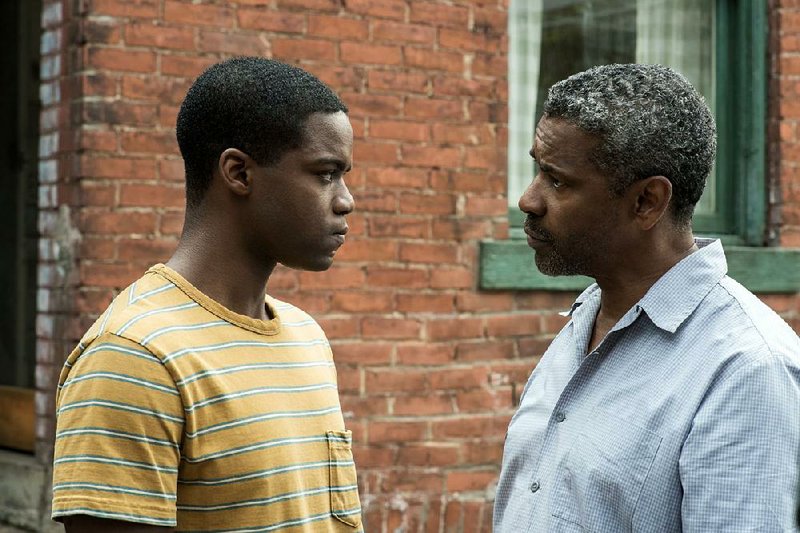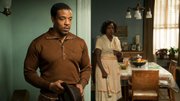The late August Wilson turned Pittsburgh's Hill District, where he grew up, into a kind of Yoknapatawpha County, setting nine of his Century Cycle plays there. Fences, the most famous of these works, features an indelible garbage man, Troy Maxson, whose life is complicated by his myriad relationships with his wife, children and brother. One of the more famous adaptations of this Pulitzer Prize winner came in 2010, with Denzel Washington playing Troy; and Viola Davis playing his loyal wife, Rose. For the film adaptation, which Washington also directed, he kept those roles the same, but added some new faces, including young Jovan Adepo, who plays Troy's youngest son Cory, and Russell Hornsby, who plays his older son, Lyons. For those two, the opportunity to act with Washington and Davis on Wilson's most revered play, was a chance of a lifetime. They spoke with us about working with the legendary Washington, Wilson's body of work, and the difficulty of acting in front of a camera.
Q. One of the hardest parts of adapting a play to the screen is to make it organically feel like a movie, with its greater breadth and freedom of movement, as opposed to a bunch of characters essentially stuck in an elevator together. Were you aware of the difference in the material from stage to screen?
Jovan Adepo: This was my first time approaching the material, getting to perform it in its entirety. I mean, I workshopped the play, but that really doesn't count, so I don't recall there being anything where anybody was going out of their way to say, "Hey, this is gonna be cut and it's gonna be built a certain way because this is a film." We just put our work into the story and made sure that the story was there.
Russell Hornsby: Actually, I really appreciate you bringing up that question. I think that the film asks audiences to do something that they haven't been asked to do in quite a number of years and that is to have patience. People talk about its level of theatricality. They keep the play foremost in their minds and don't allow themselves to separate the play from the film. When they're saying it's theatrical and not thinking that it's filmed cinematically, they're taking away from what Denzel's work as a director. We had to take the film out of the backyard, put it in the house, put it in the front yard. We had to take the characters and put them at work at a bar. That's cinema. We asked the audience to have patience. Let the story develop. I think audiences aren't used to actually sitting down and watching a story unfold and watching characters develop over time. It's a well made story that is told through film. All we're saying is, "Be patient." What Shakespeare says, you have to earn the pause.
Q. I can't remember which actor said it, but someone who did both mediums talked about enjoying the stage a lot more because you got to act with more than just your eyes. Can you relate to that?
RH: You're right, but because we're acting with more than just our eyes, it's not necessarily the theatrics. It's the characters that [Wilson] wrote. The characters that he wrote are three-dimensional so they force you to engage. You have to react with your full body because these are full, three-dimensional people. You need to see how they react with their legs and the arms. Speaking culturally specifically, we are people who live in our bodies, and you need to capture that. We live in our whole body. We don't just live up here [points to head]. It's the material that asks you to do that, and that says we need to get everything. We need to get how they mimic slap hands, kick somebody under the table. We need to get everything because that's informing the world.
Q. Wilson's character focus is so specific, so well drawn, that it practically does all the work for you as a reader. He gives you these completely realized characters, gives them their distinct voices, so you can picture them perfectly. Is that a gift for an actor, or a kind of burden because the character is already so specific?
JA: I think with a lot of August Wilson's work, it's so specific just because of the environment and the times. Wilson was a listener. He was an observer of people. He's writing in a voice that's very specific, so you wanna stay with what he gives you because he's writing each of the characters and the personalities that way and putting them all in this environment together for a reason. I think the best thing for an actor who's approaching August Wilson's work is to stay to the material. There are occasions where you get a blank slate and the director or writer will tell you to season where it applies for you. I think August's words are so poetic and have such a rhythm to them, you just have to stay on track with what he's providing to you.
Q. Was it intimidating to work with Denzel Washington, one of the more decorated actors of his generation, especially as he was the star and the director?
JA: I didn't see that as a drawback, because this was my first feature, a major project. It was just like having a teacher all the time, which is exactly what I was hoping for. I was working with such a high level of talent from all my cast members, that it was only beneficial to have somebody that I knew I could always look to for guidance at any given moment, whether he was in the scene with me or was directing from behind the camera. He was my guiding eye to make sure that I was always focused and wasn't getting ahead of myself. If he ever felt that I could have made a stronger choice, he would never beat me to the punch. He would never give me the answer. He would say, "I like the choices you made, perhaps ..." He would suggest something and then leave it there. He'd shake my hand and walk away, like, "I'm gonna leave you alone 'cause I know you got it already."
Q. His character is so much the focal point of the play, especially in the early going, with all the other characters filtering through him. Is that exhilarating or exhausting as an actor, knowing all the energy of the performance has to be driven by you?
RH: It depends on your approach to it, obviously, how you choose to look at it. I think anybody who's going to approach one of the towering characters in a Wilson play has to look at it as exhilarating because you're taking an opportunity to tell the story. It's important. It's vital that you have vitality and energy when you approach a character. I think Denzel had that and he showcased it in spades. August's characters, they demand that you bring your level best. They demand that you bring every ounce of who you are, because these aren't archetypes. These are specific people. That's why they jump up off the page. That's why it is so brilliant, because they are so specific. He chose to write about these people for a reason. He chose to pair these seven people or these nine people for a reason to tell their story. Not you telling your story. You're telling it through them and you have to keep your eyes to the character and, if you do, you'll get it. August Wilson is for everybody, but not everybody can play August Wilson. They're people who like to have fun, but they ain't funny people.
Q. You were speaking before about how the film is totally relatable, even though it's very much steeped in a precise element of black culture. Somehow, Wilson's work manages to be extremely specific, and really universal. Does it feel that way to perform it?
RH: I think, we get to the universal through the specific: We have to be specific to our culture. We have to be specific to these African-American people and then we can serve the universal, but we have to tell our story our way. That's what August chose to do. Then, yes, there is something everybody can glean from this Troy Maxson and where that resonates. Our rhythms are different. Our way is different. How we say, "Good morning" and how we say, "Good night" is different. But, everybody says, "Good morning" and "Good night." Everybody asks for food. Everybody wants a drink. Men look at a woman walking by and they react a certain way. Now, brothers act differently from white folks. That's just what happens.
I think that's what audiences appreciate. I can still appreciate Death of a Salesman. I still love A Streetcar Named Desire because that's specific. Arthur Miller and Tennessee Williams wrote something specific which I can still gain something from. That's what's special about art, and what we're trying to say. We do the art for the people, but on the art's terms. We're going to tell it our way. Then, if it's done right, if it's done truthfully, you will get something from it.
MovieStyle on 02/10/2017


